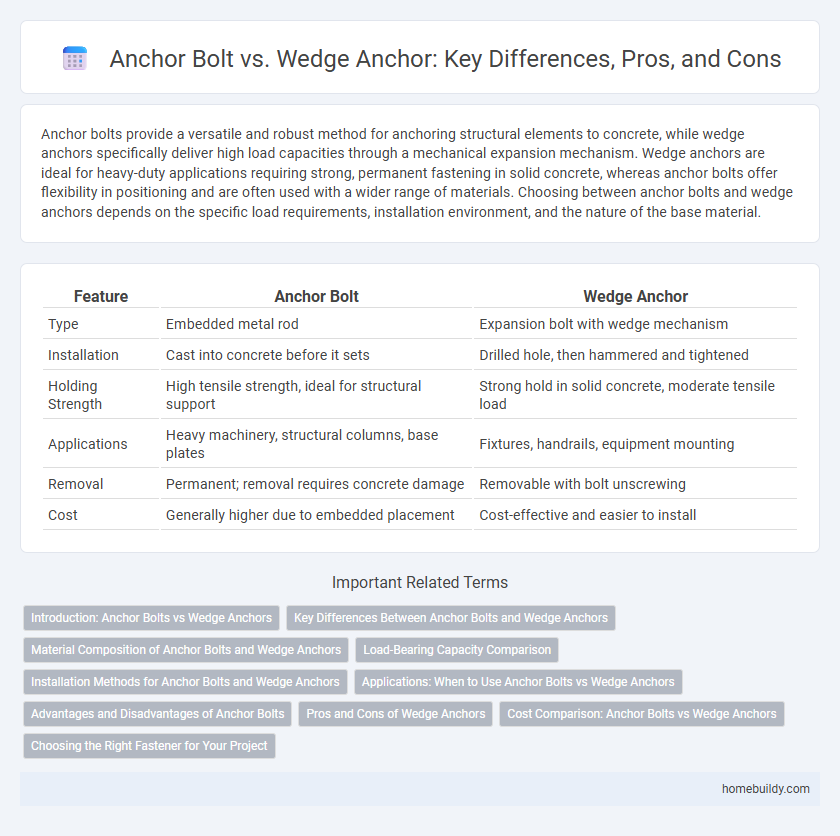Anchor bolts provide a versatile and robust method for anchoring structural elements to concrete, while wedge anchors specifically deliver high load capacities through a mechanical expansion mechanism. Wedge anchors are ideal for heavy-duty applications requiring strong, permanent fastening in solid concrete, whereas anchor bolts offer flexibility in positioning and are often used with a wider range of materials. Choosing between anchor bolts and wedge anchors depends on the specific load requirements, installation environment, and the nature of the base material.
Table of Comparison
| Feature | Anchor Bolt | Wedge Anchor |
|---|---|---|
| Type | Embedded metal rod | Expansion bolt with wedge mechanism |
| Installation | Cast into concrete before it sets | Drilled hole, then hammered and tightened |
| Holding Strength | High tensile strength, ideal for structural support | Strong hold in solid concrete, moderate tensile load |
| Applications | Heavy machinery, structural columns, base plates | Fixtures, handrails, equipment mounting |
| Removal | Permanent; removal requires concrete damage | Removable with bolt unscrewing |
| Cost | Generally higher due to embedded placement | Cost-effective and easier to install |
Introduction: Anchor Bolts vs Wedge Anchors
Anchor bolts are embedded into concrete to provide a secure fastening for structural elements, relying on mechanical interlock and grout bonding for stability. Wedge anchors, a specific type of expansion anchor, use a wedge-shaped clip that expands against the sides of a drilled hole, offering high shear strength and quick installation. Understanding the distinct applications and installation methods of anchor bolts versus wedge anchors is essential for selecting the appropriate fastener in construction projects.
Key Differences Between Anchor Bolts and Wedge Anchors
Anchor bolts are typically embedded in concrete before it sets to provide structural support, while wedge anchors are installed after the concrete has cured by expanding securely within drilled holes. Anchor bolts offer superior load distribution and are suited for heavy-duty structural applications, whereas wedge anchors provide ease of installation and strong holding power for medium-duty fastening. Material composition and application environments also differ, with anchor bolts often galvanized for corrosion resistance and wedge anchors commonly used for fastening machinery or equipment to concrete surfaces.
Material Composition of Anchor Bolts and Wedge Anchors
Anchor bolts are typically made from carbon steel, stainless steel, or galvanized steel, offering reliable corrosion resistance suited for concrete foundation applications. Wedge anchors, composed mainly of high-strength carbon steel or stainless steel, feature a unique expansion clip that enhances grip in solid concrete. Both materials are selected to optimize durability and load-bearing capacity in structural anchoring systems.
Load-Bearing Capacity Comparison
Anchor bolts and wedge anchors differ significantly in load-bearing capacity, with wedge anchors typically designed to withstand higher tensile and shear forces due to their expansion mechanism that secures them tightly within concrete substrates. Anchor bolts provide reliable load support primarily through embedded length and material strength but may offer lower resistance to dynamic loads compared to wedge anchors. Load-bearing capacity evaluations must consider factors such as installation depth, concrete strength, and application-specific requirements to select the appropriate fastener type.
Installation Methods for Anchor Bolts and Wedge Anchors
Anchor bolts require pre-drilling a hole and setting the bolt with wet concrete or epoxy to secure it firmly, ideal for heavy-duty structural connections. Wedge anchors are installed by drilling a hole, inserting the anchor, and tightening the nut to expand the wedge, providing strong mechanical fastening in solid concrete. Both installation methods demand precise hole depth and diameter according to anchor specifications to ensure optimal load-bearing capacity and safety.
Applications: When to Use Anchor Bolts vs Wedge Anchors
Anchor bolts are ideal for securing structural elements in concrete, especially in heavy-duty construction where long-term stability is crucial, such as in the installation of steel columns and baseplates. Wedge anchors provide high holding power for medium to heavy loads and are commonly used in concrete walls and floors for fastening machinery, handrails, and brackets. Selecting between anchor bolts and wedge anchors depends on the specific load requirements, concrete thickness, and the need for removable versus permanent fastening solutions.
Advantages and Disadvantages of Anchor Bolts
Anchor bolts offer superior load distribution and corrosion resistance compared to wedge anchors, making them ideal for heavy-duty structural applications and outdoor environments. Their installation requires precise placement during concrete pouring, which can complicate adjustments and prolong construction timelines. While wedge anchors provide quick installation and strong holding power in existing concrete, anchor bolts ensure enhanced stability and durability for critical infrastructure support.
Pros and Cons of Wedge Anchors
Wedge anchors provide superior holding strength in concrete due to their expansion mechanism, making them ideal for heavy-duty applications requiring high load capacity. However, wedge anchors can be more challenging to install properly, as precise hole depth and cleanliness are critical to ensure secure engagement and avoid installation failures. Their susceptibility to corrosion in certain environments necessitates selecting stainless steel variants for improved durability in outdoor or moist conditions.
Cost Comparison: Anchor Bolts vs Wedge Anchors
Anchor bolts generally offer a lower initial cost compared to wedge anchors, making them a budget-friendly option for many construction projects. Wedge anchors, while typically more expensive, provide enhanced holding power and durability in concrete applications, justifying the higher price in critical load-bearing situations. Choosing between anchor bolts and wedge anchors depends on balancing upfront expenses against long-term performance and safety requirements.
Choosing the Right Fastener for Your Project
Anchor bolts provide superior strength and are ideal for heavy-duty applications requiring high shear resistance, while wedge anchors excel in concrete fastening due to their easy installation and reliable grip. Selecting the right fastener depends on project requirements including load capacity, substrate material, and environmental conditions. Wedge anchors are often preferred for solid concrete, whereas anchor bolts suit projects demanding structural anchoring with customizable embedment depths.
Anchor bolt vs Wedge anchor Infographic

 homebuildy.com
homebuildy.com